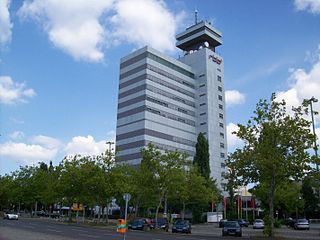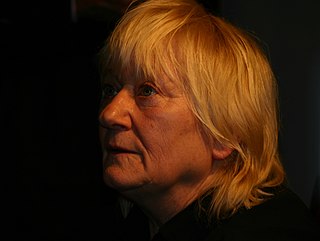Related Research Articles

DEFA was the state-owned film studio of the German Democratic Republic throughout the country's existence.
Das Erste is the flagship national television channel of the ARD association of public broadcasting corporations in Germany. ARD and ZDF – "the Second" German Television Channel – together comprise the public service television broadcasters in the German television system. Das Erste is jointly operated by the nine regional public broadcasting corporations that are members of the ARD.

Johannes Bobrowski was a German lyric poet, narrative writer, adaptor and essayist.

Rundfunk Berlin-Brandenburg is an institution under public law for the German states of Berlin and Brandenburg, based in Berlin and Potsdam. RBB was established on 1 May 2003 through the merger of Sender Freies Berlin (SFB) and Ostdeutscher Rundfunk Brandenburg (ORB), based in Potsdam, and is a member of the Association of PSBs in the Federal Republic of Germany (ARD).

Babelsberg Film Studio, located in Potsdam-Babelsberg outside Berlin, Germany, is the oldest large-scale film studio in the world, producing films since 1912. With a total area of about 460,000 square metres (5,000,000 sq ft) and a studio area of about 25,000 square metres (270,000 sq ft) it is Europe's largest film studio.
Bayerischer Fernsehpreis is an award presented by the government of Bavaria, Germany since 1989. The prize symbol is the "Blue Panther", a figure from the Nymphenburg Porcelain Manufactory. The prize money is €10,000.

Ulrike Haage is a German pianist and composer, producer for radio plays and a sound artist.

RBB Fernsehen is a German free-to-air television channel owned and operated by Rundfunk Berlin-Brandenburg (RBB) and serving Berlin and Brandenburg. It is one of the seven regional "third programmes" that are offered within the federal ARD network.
Maren Niemeyer is a German journalist, author and documentary filmmaker.
Hörbuchbestenliste is a literary prize of Germany.

The Hörspielpreis der Kriegsblinden, also known as the Kriegsblindenpreis is the most important literary prize granted to playwrights of audio plays written in the German language. The award was established in 1950 by the Bund der Kriegsblinden Deutschlands e.V. (BKD), a German organization for soldiers and civilians blinded during war, whether from working with munitions or explosives or from a bomb attack or while in flight from an attack.

Nikolai von Koslowski is a German journalist and award-winning director of radio plays like Die Stammheim Bänder in 2009 and the prestigious Deutschen Hörbuchpreis.
The Axel-Springer-Preis is an annually awarded prize. The Award is given to young journalists in the categories Print Journalism, TV Journalism, Radio Journalism and Online Journalism due to the decisions of the Axel-Springer-Akademie.

Carmen-Maja Antoni is a German actress.

Christian Redl is a German actor and singer.
Manfred Richter is a German writer, scriptwriter and dramaturg.
Rainer Böhm was a German composer.

Annette Dittert is a German author, filmmaker, correspondent, and journalist.
Degeto Film GmbH is a film rights trader and production company of the ARD, based in Frankfurt am Main. Its shareholders are the regional broadcasting corporations of ARD or their advertising subsidiaries.
References
- ↑ Elke Schieber. "Koepp, Volker * 22.6.1944 Dokumentarfilmregisseur" (in German). Bundesstiftung zur Aufarbeitung der SED-Diktatur: Biographische Datenbanken. Retrieved 17 May 2015.
- ↑ Tadeusz Białecki, "Historia Szczecina" Zakład Narodowy im. Ossolińskich, 1992 Wrocław. Pages 9, 20–55, 92–95, 258–260, 300–306
- 1 2 3 4 "Volker Koepp Germany". Doc Alliance Films, Prague . Retrieved 16 May 2015.